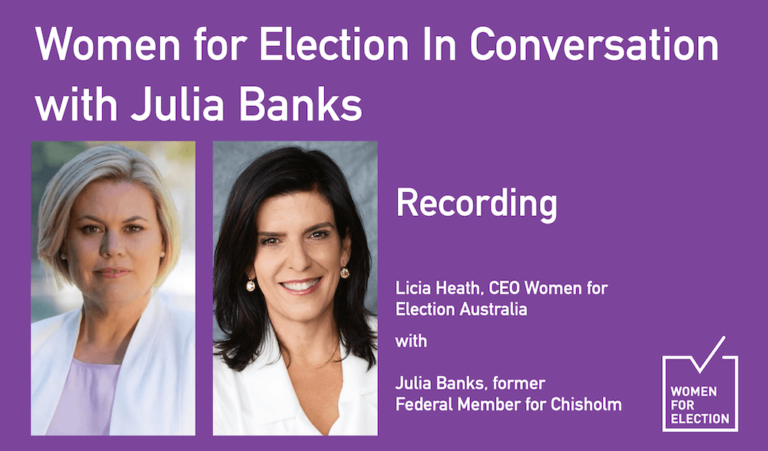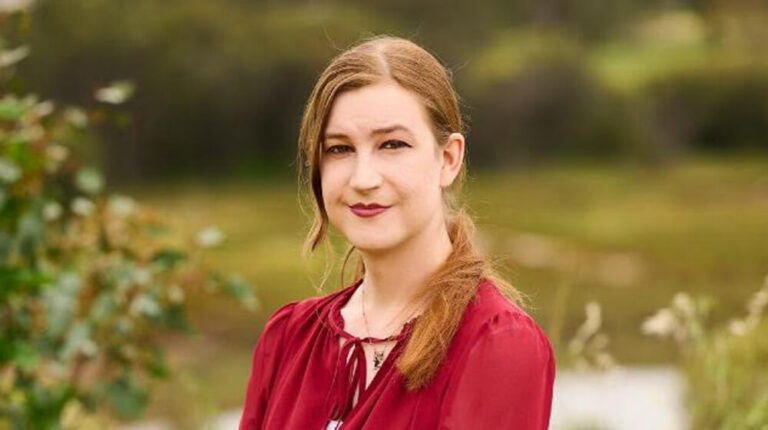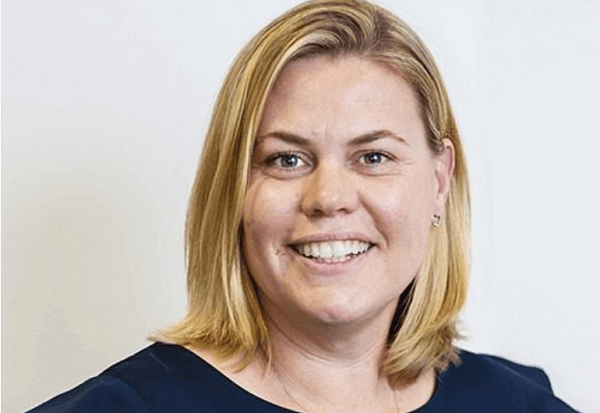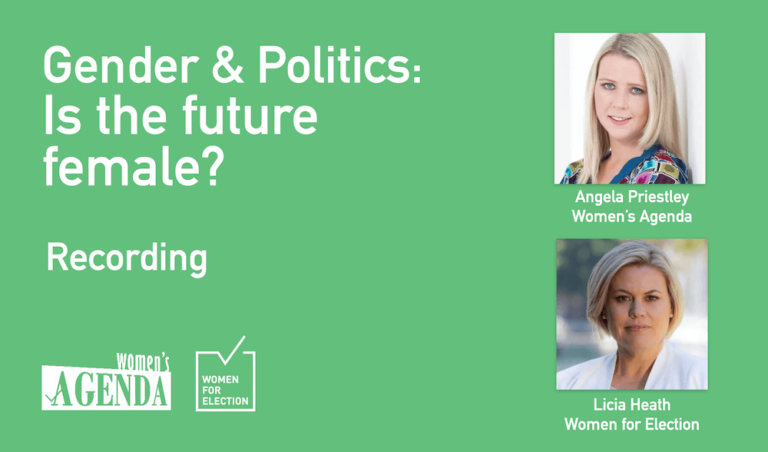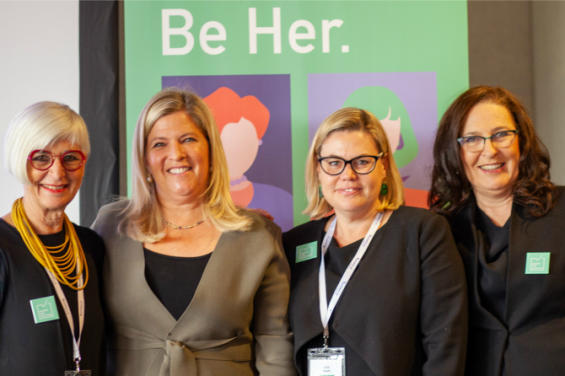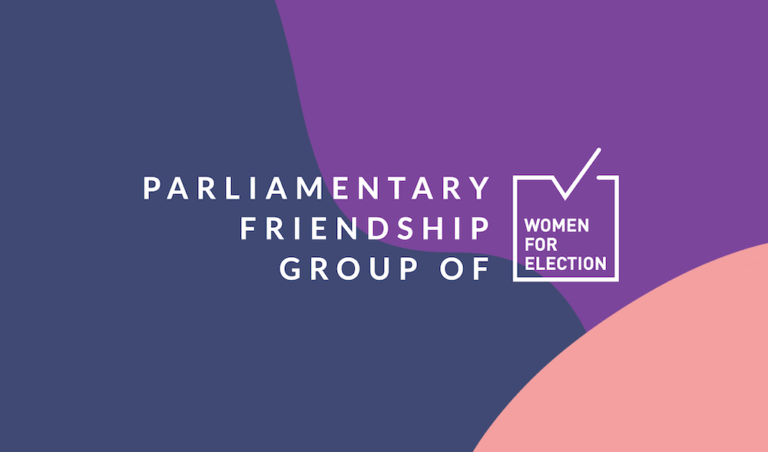Article: Licia Heath: “I wasn’t sure who they were representing, but it definitely wasn’t me.”
Article published by Women & Leadership Australia.
Licia Heath is the CEO of Women For Election Australia (WFEA). Earlier this year she spoke at the Australian Women’s Leadership Symposium in Sydney about why it is so important to advance gender parity in all levels of politics. We found her talk both inspiring and enlightening, and wanted to hear more from her, so we jumped on the phone to ask some follow up questions. This is what Licia had to say.
What was your relationship with politics like before you decided to run for the seat of Wentworth?
Licia: Well, it’s not until recent years that I really had anything to do with politics or politicians. It was all by accident, and started from running a community based campaign for a new high school in the Wentworth area. Through that, I got to meet a lot of state and federal members and other politicians. Some of those meetings I left feeling they had been impressive people, but others I thought ‘I could do better than this!’
From these experiences, a few other things dawned on me. One was that I hadn’t really been paying attention to politics; I wouldn’t have been able to tell you who my local members were, I wasn’t able to say what seat I lived in, in a federal sense, or tell you that it’s a different seat from the state one. I wasn’t paying attention to who was representing me.
As the school campaign went on it also dawned on me that I wasn’t sure who they were representing, but it definitely wasn’t me.
Was that what inspired you to run for the Wentworth by-election?
Licia: No, it wasn’t actually. Fast forward 2-3 years from the school campaign, and I had an increasing frustration with how the parliament was being run. I watched the NBN infrastructure project start as a really fantastic idea and then get ratcheted down until something very substandard was put in place for our country. The only reason I could see for that was party politics, nothing else. And now our country has really horrific electronic infrastructure because of it, and that really agitated me.
It was the same with energy policy, which was what really made me want to run in Wentworth. My local member was Malcolm Turnbull and he was trying to get energy policy through, and it wasn’t even the Labor Party on this occasion fighting against it – it was his own party! They were more concerned about winning in their own party than getting a win for the country.
When the by-election was called, I had built up some personal currency in the seat from running the school campaign, so I had a profile in Wentworth by that stage. I had been on the board of Women for Election Australia for about 15 months, attending their training sessions. I had gained so much knowledge on how government works, how to run a campaign, how to front the media and more, and I just thought ‘I’m never going to get this chance again.’
What did you learn when you were running for election?
Licia: I think one of the most powerful things I recognised was that the community that I lived in, who had been thought of as a homogenous group of mansion loving fat cats, just weren’t. That’s not who lives here. In actual fact, the power of just knowing that the neighbour to the left of you and the neighbour to the right of you had the same views and frustrations was really, really powerful. Even if they lived very different lifestyles, they shared progressive views in that they wanted their country to progress.
That is the exact opposite of what a lot of people will tell you, whether it is the press or spin doctors who aim to cause division. If you know your neighbour thinks the same way as you, you are more likely to unite and go and do something together. Otherwise, we don’t talk to each other as a consequence. That’s how the change happened in terms of Kerryn Phelps getting elected. More people believed that change could happen. People suddenly became engaged. And the more they got engaged, the more they were determined to change the status quo.
How have these lessons informed what you do now at Women for Election Australia (WFEA)?
Licia: It has shown me that we need to normalise how we talk about politics. In Australian culture we tend to get really uncomfortable when we talk about politics. But if we can have open, civil discussion, that’s really healthy. And we should encourage that.
I realise that one of the biggest hurdles we have to overcome is simply engaging people in politics. We have a three step process at WFEA to help get more women into politics: Inspire, Equip and Sustain. We focus on different steps depending on election cycles and the greatest need at the time. Inspire is all about talking to women about why they should run – telling them about the changes they can make, how they can address their community’s frustrations and actually make a difference.
At the Equip stage, our aim is to make what is currently a very opaque process (running for public office) more transparent. We provide a step by step framework from deciding you want to run, all the way to election night. We talk about social media and pre-selection and volunteers and how to fundraise and what to say when you are fronting up to the press. We have current and former female politicians from all sides of politics talk to our attendees, so that the potential candidates can really get a sense of what it is like from someone who has been there.
And the last step is to sustain; we need to support women once they get elected, and also sustain a pipeline of women so that as women retire or move on, there are more women equipped to take their place.
Why do you think people should support Women for Election Australia?
Licia: Because Australia stands to benefit in so many ways if we have a more representative parliament. People need to be able to engage with politics and with their local member and they won’t if they don’t see themselves represented. It’s not acceptable that women make up 51% of the population but 30% of our politicians. Research shows us that people have an increased trust in their politicians and democracy when governments are more representative of their population. But how do women find out the first steps on how to run when it’s all kept so secret? That’s where WFEA can help. People ask me if I’ll ever run for office again, but I’d rather help 1,000 women successfully run first. We all know a woman (or three!) who would be great political representatives of their community. Let’s help them get there!
WFEA is running a workshop in Canberra to inspire and equip more women to run for politics. You can see the details and book here.


